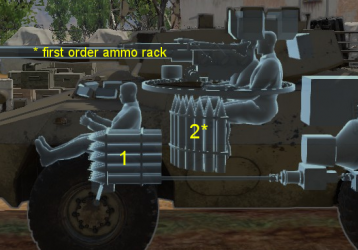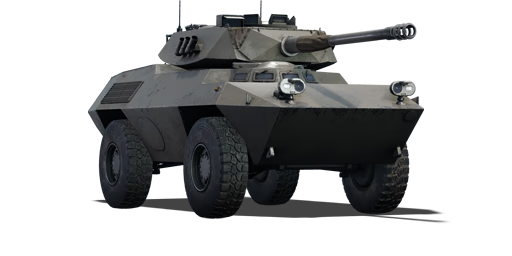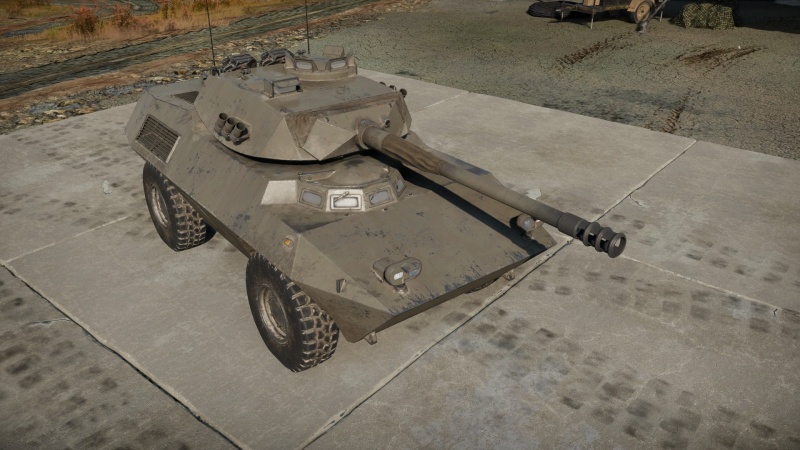Difference between revisions of "AUBL/74"
(Combat usage added) (Tag: Visual edit) |
m (Tag: Visual edit) |
||
| Line 176: | Line 176: | ||
Peaking and firing in shoot and scoot is also suggested, as the small numbers of crew members on the AUBL won't usually resist a shell on the turret - firing before being seeing is one of the ways of engaging threats; with a hint of luck, one shot will be enough. | Peaking and firing in shoot and scoot is also suggested, as the small numbers of crew members on the AUBL won't usually resist a shell on the turret - firing before being seeing is one of the ways of engaging threats; with a hint of luck, one shot will be enough. | ||
| − | {{Notice|Practicing with the shortstop key and | + | {{Notice|Practicing with the shortstop key and 'sight lock' on options can increase the accuracy when doing quick shots, as the AUBL/74 lacks any stabilization}} |
'''Flanking ''' | '''Flanking ''' | ||
Revision as of 12:11, 7 March 2021
Contents
Description
The FIAT AUBL/74 is a rank IV Italian light tank with a battle rating of 6.3 (AB) and 6.7 (RB/SB). It was introduced in Update 1.85 "Supersonic". It features good mobility and a low pressure Cockerill Mk. III 90 mm gun.
General info
Survivability and armour
Armour Type:
- Rolled homogeneous armour (hull, turret)
- Cast homogeneous armour (gun mantlet)
- Wheel (tires)
| Armour | Front (Slope angle) | Sides | Rear | Roof |
|---|---|---|---|---|
| Hull | 8 mm (74°) Upper Glacis 8 mm (29-36°) Driver viewport glacis 8 mm (44°) Lower Glacis |
8 mm (36-46°) Top 5 mm (39°) Engine vents 8 mm (22-30°) Bottom 8 mm Wheelwells |
8 mm (11°) Upper plate 8 mm (44°) Lower glacis |
8 mm (16°) Front glacis 8 mm (spherical) Driver hatch 8 mm Centre 8 mm (4°) Rear |
| Turret | 15 mm (24°) Turret front 8 mm (13°) Turret Cheeks 15 mm (8-50°) Gun Mantlet |
8 mm (33°) 15 mm (cylindrical) Cupola well 8 mm (68-72°) Turret underside |
8 mm (11°) | 8 mm (85°) Front 8 mm Centre & Rear |
| Cupola | 15 mm (cylindrical) | 8 mm | ||
Notes:
- The tires are 10 mm thick and the suspension rods are 1 mm thick.
- The side engine grilles are only 5 mm thick, so make sure to protect those weak points.
- There is an engine grille on the roof which is also only 5 mm thick. A weak point planes might look to take advantage of.
- This vehicle unfortunately hull breaks quite easily.
- A tightly spaced crew of three makes it easily taken out by machine guns and autocannons.
Mobility
| Game Mode | Max Speed (km/h) | Weight (tons) | Engine power (horsepower) | Power-to-weight ratio (hp/ton) | |||
|---|---|---|---|---|---|---|---|
| Forward | Reverse | Stock | Upgraded | Stock | Upgraded | ||
| Arcade | 112 | 22 | 8.2 | 248 | 305 | 30.24 | 37.2 |
| Realistic | 100 | 20 | 142 | 160 | 17.32 | 19.51 | |
Modifications and economy
Armaments
Main armament
| 90 mm Cockerill Mk.3 | Turret rotation speed (°/s) | Reloading rate (seconds) | |||||||||||
|---|---|---|---|---|---|---|---|---|---|---|---|---|---|
| Mode | Capacity | Vertical | Horizontal | Stabilizer | Stock | Upgraded | Full | Expert | Aced | Stock | Full | Expert | Aced |
| Arcade | 32 | -9°/+27° | ±180° | N/A | 28.6 | 39.5 | 48.0 | 53.1 | 56.5 | 7.80 | 6.90 | 6.36 | 6.00 |
| Realistic | 17.9 | 21.0 | 25.5 | 28.2 | 30.0 | ||||||||
Ammunition
| Penetration statistics | |||||||
|---|---|---|---|---|---|---|---|
| Ammunition | Type of warhead |
Penetration @ 0° Angle of Attack (mm) | |||||
| 10 m | 100 m | 500 m | 1,000 m | 1,500 m | 2,000 m | ||
| M620A1 | HEATFS | 250 | 250 | 250 | 250 | 250 | 250 |
| M625A1 | HESH | 102 | 102 | 102 | 102 | 102 | 102 |
| Shell details | |||||||||
|---|---|---|---|---|---|---|---|---|---|
| Ammunition | Type of warhead |
Velocity (m/s) |
Projectile Mass (kg) |
Fuse delay (m) |
Fuse sensitivity (mm) |
Explosive Mass (TNT equivalent) (g) |
Ricochet | ||
| 0% | 50% | 100% | |||||||
| M620A1 | HEATFS | 890 | 4.10 | 0.0 | 0.1 | 890.4 | 65° | 72° | 77° |
| M625A1 | HESH | 800 | 4.50 | 0.4 | 0.1 | 1,200 | 73° | 77° | 80° |
| Smoke shell characteristics | ||||||
|---|---|---|---|---|---|---|
| Ammunition | Velocity (m/s) |
Projectile Mass (kg) |
Screen radius (m) |
Screen deploy time (s) |
Screen hold time (s) |
Explosive Mass (TNT equivalent) (g) |
| M618A1 | 714 | 5.3 | 20 | 5 | 25 | 50 |
Ammo racks

| Full ammo |
1st rack empty |
2nd rack empty |
Visual discrepancy |
|---|---|---|---|
| 32 | 13 (+19) | 1 (+31) | No |
Notes:
- Shells are modelled individually and disappear after having been shot or loaded.
- Rack 2 is a first stage ammo rack. It totals 12 shells and gets filled first when loading up the tank.
- This rack is also emptied early: the rack depletion order at full capacity is: 2 - 1.
- Simply not firing when the gun is loaded will move ammo from racks 1 into rack 2. Firing will interrupt the restocking of the ready racks.
Machine guns
| 7.62 mm Beretta MG42/59 | ||||
|---|---|---|---|---|
| Mount | Capacity (Belt) | Fire rate | Vertical | Horizontal |
| Coaxial | 800 (200) | 1,200 | N/A | N/A |
Usage in battles
The AUBL/74 is most effective in a scout-support role from cover or when flanking. This could perhaps be the best way of engagements as the extremely weak armour of the AUBL will not be enough to resist almost any frontal engagements. If the frontal engagements are a necessity, the HEAT shell can penetrate most enemies at the rank, but the post-penetration damage is unreliable. Most shots should be spread out to the crew members like the gunner. With the AUBL's slower than average reload speed, an enemy with high crew agility and expert qualification can get their gunner back and shoot before the reload, so the turret or ammo racks are often the best areas to eliminate enemy tanks.
Peaking and firing in shoot and scoot is also suggested, as the small numbers of crew members on the AUBL won't usually resist a shell on the turret - firing before being seeing is one of the ways of engaging threats; with a hint of luck, one shot will be enough.
| Practicing with the shortstop key and 'sight lock' on options can increase the accuracy when doing quick shots, as the AUBL/74 lacks any stabilization |
Flanking
The greater than average speed allows this agile tank to reach a reliable over-watch position early in the match. Also making it possible to scout enemies and take 'pot-shots' if the opportunity arises. The flanking approach will be mainly directed towards spotting and opportunistic medium-ranged ambushes, whilst sniping is the last choice and the one requiring most of the skills - because the rather small calibre HEAT rounds and the ballistics might not perform as desired in large distances and could just reveal the location to enemies.
Therefore, playing this vehicle like an M18 Hellcat or any other fast vehicles with shells as the APCBC is ill-advised, because often it won't be able to kill flanked enemies in one reliable shot, leaving the light tank open to retaliation fire. Albeit, the HEAT shell is not completely adverse, it can be a great light tank hunter and will effortlessly trigger a hull break. These fast light vehicles, anti-air or APCs are typically encountered during flanking manoeuvres.
The amphibious ability increases drastically the possibilities of ambushes and locations that can be exploited by this light tank, on maps like Kuban, Eastern Europe or Tunisia. Is important to note the inferior performance on rough terrains, this should be taken into account when deciding to spawn in a snowy map like Frozen pass for example. As one of the best advantages of the AUBL, the speed, will be hampered. Switching the vehicle into a more sluggish support light tank than an energetic flanker. Paved roads and urban maps like Maginot line, on the other hand, bring a lot of possibilities to this light tank but could lead to unwanted frontal engagements. Players should contemplate all this when operating the AUBL.
Another issue related to flanking is the engine deck. It will limit the gun's depression when looking from behind the AUBL, so is better to avoid pushing into situations where the enemy might attack from behind - or avoid infiltrating behind enemy lines.
Support
The Italians and allies could always be backed up and updated with the enemies' location thanks to the AUBL/74's scouting capacities. This is twice as valuable if the player also brings an multi-purpose aircraft in the line up to provide air support. Players that couple the airstrike and scouting abilities of this apparent modest light tank can considerably influence battles.
The smoke shells can be equipped depending on the methods of the player and will be good enough to hinder enemy positions and obscure the allied team's advance - at least for a short while.
Despite the apparent passive approach, the support role also supposes to remain with the brawling tanks in the frontline while performing repairs and having a chance to assist in the point captures. The speedy turret rotation does help in this close-support usage, as the confrontations require good reflexes and rapid responses; not omitting the importance of a tactical retreat with the good reverse and smoke charges and keeping a plan for the next move, as with most wheeled vehicles, it won't be able to turn on the spot.
Overall the whole vehicle performance in Realistic battles is hugely affected by the map and the tactic approach to it. Because of the only high-explosive shells available for the AUBL/74, the players might choose to perform close-support or flanking. If flanking in a tree-abundant map, keep in mind the sensibility of the HEAT fuze - even the smallest of the bushes can detonate the warhead and jeopardise the entire vehicle. And if fighting in a rural muddy or snowy environment, all speed advantage and flanking potential is lost against the regular tracked vehicles.
Arcade Battles
In arcade battles, the usage becomes more uncomplicated. There's no limit to the speed in any map and the brawling style can be forgivingly applied. Thought, the aircraft machine gun and cannon fire remain a concern. As well as the loss of the element of surprise when attacking other tanks that most of the time will be stronger in either armour or crew size - Playing along with teammates and moving in and out of combat is one key to survival.
Pros and cons
Pros:
- 90 mm HEATFS comes stock - HESH and smoke shells are unlockable later
- Rather good traverse and elevation rates allowing for quick reaction to incoming enemies
- Fast on-road mobility with a decent reverse speed
- Recoil is not too strong, making aiming the follow-up shot much easier than other light tanks
- Multi-purpose tank: scouting, ambushing, flanking, smoke shells, convenient night vision plus can repair friendly units
- Can swim!
Cons:
- Light armour is vulnerable to .50 calibre and aircraft cannons from most angles
- Bad off-road speed can barely break 25 km/h; wheeled configuration struggles on soft terrain like sand and snow
- Lightweight and tall profile; prone to ramming and shockwaves, a bomb going off nearby can flip the vehicle entirely
- No stabilization; the vehicle must stop to fire accurately
History
The AUBL/74 is built upon the FIAT 6616 chassis. Rather than equipping the standard 20mm, it could be equip with a 90mm or a 60mm HVG gun to fit the Italian army requirements. The project was a collaboration between FIAT and OTO Melara and saw extensive use for peace keeping operations.
Its engine, radiators, and transmission were separated behind a fireproof bulkhead to provide additional survivability to the crew. It also featured NBC filters and run-flat tires. Its most common variant was armed with a 20mm cannon with an optional 9M14 Malyutka ATGM.
Media
- Skins
- Videos
See also
- Vehicles equipped with the same chassis
- Other vehicles of similar configuration and role
External links
Paste links to sources and external resources, such as:
- topic on the official game forum;
- encyclopedia page on the tank;
- other literature.
| Italy light tanks | |
|---|---|
| Italy | |
| L6/40 | L6/40 · L6/40 (31 Rgt.) |
| M11/39 | M11/39 |
| Autoblindo | AB 41 · AB 43 |
| Fiat 6614/6616 | FIAT 6614 · AUBL/74 · AUBL/74 HVG |
| R3 Capraia | R3 T106 FA |
| Centauro | Centauro I 105 · Centauro I 105 R · Centauro I 120 · Centauro RGO · VRCC |
| Freccia | VBC (PT2) · Freccia |
| Dardo | Dardo · VCC-80/60 · VCC-80/30 |
| Other | C13 T90 |
| USA | ▄M3A3 · ▄M24 · ▄M18 |
| Hungary | |
| WWII | Csaba · Toldi IIA |
| Post | ◔BTR-80A · KF41 |





